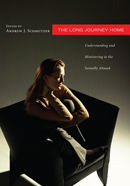A Theology of Sexuality and its Abuse: Creation, Evil, and the Relational Ecosystem, Part 1
Editorial Introduction
Please join us for a short series reprinting chapters from The Long Journey Home: Understanding and Ministering to the Sexually Abused.
Beginning a conversation about sexual abuse is uncomfortable, but we feel strongly that this topic is something the church needs to address. We believe the testimonies of authentic recovery can help us embrace the pain of the hurting and make openings for God to bring healing.
Several terms, prompted by an asterisk (*), have been defined by pastors, therapists, and theologians that contributed to the book and are included in a select glossary. Please also continue the conversation with Andrew Schmutzer as he answers questions throughout this series.

An excerpt from The Long Journey Home: Understanding and Ministering to the Sexually Abused, edited by Andrew J. Schmutzer.
There is a mystery to sexuality that demands respect. The most treasured relationships in Scripture—personal, national, and divine—draw deeply on sexual imagery: “as a bridegroom rejoices over his bride, so will your God rejoice over you” (Isah 62:5b, cf. Rev 21:2, 9).1 Paul’s language to the Corinthians also employs sacred motifs of sexuality: “I promised you to one husband, to Christ, so that I might present you as a pure virgin to him” (2 Cor 11:2b). Appropriately, Brueggemann states:
[F]aith that must resort to the most erotic imagery to speak about a covenantal relationship that operates at the deepest levels of trust and intimacy is useful indeed … the outcome of such usage is a relationship glorious in its intimacy and costly in its brokenness. The Bible understands that sexuality is the ultimate arena of cost and joy.2
So how does a sexually abused child carry both cost and joy into their adult life? How does a young woman anticipate her marriage—“glorious in its intimacy”—when her own father has sexually betrayed her during her years of nurture, leaving his child with a defining experience “costly in its brokenness?” Sexuality may be “personal,” but it is never private.3 Whether in brokenness or gloriousness, sexuality functions within a grand web of embodied relationships that are fragile, connected, and enduring.
Sexual Abuse, Scripture and Theology: A Messy Obligation
In this chapter we focus on a *biblical theology of sexuality primarily through the texts of creation (Genesis 1–3). Secondarily, we will observe how sexuality and its desecration reverberates through Scripture: in narratives of sexual violation (e.g., 2 Samuel 13), in Jesus’ prescriptive model for human sexual behavior (Mark 10:6–9), and in Paul’s letter of moral exhortation (1 Thess 4:1–8). Throughout, however, our chief interest is in the significance of the relational dynamics that surround sexuality and its violation, including agency, consequences, *intergenerational transmission, and the way sin, evil, and community are portrayed in violence that is sexual in nature.
Using a biblical theological approach enables us to highlight literary, historical, and thematic trajectories in these texts. Further, a combination of these elements, within the context of Christian faith, forms a “plausibility structure”4 of Scriptural reading that is sensitive to the on-going truths of these biblical stories—both the horizontal and vertical realities of human sexuality.5 After all, the “horizontal dimensions of biblical theology cannot be separated from the vertical ones: love of neighbor is practiced within the claim divine love makes upon humankind.”6 Note this relational dynamic that James K. Mead highlights in his useful definition:
Biblical theology seeks to identify and understand the Bible’s theological message and themes, as well as how the Bible witnesses to those themes and to whom and by whom it declares that message. The outcome of such investigation will lead us to hear what the Bible says about God’s being, words, and actions; about God’s relationship to all creation, especially humankind; and about the implications this divine-human encounter has for relationships between human beings.7
The literature on gender, sexuality, and *sexual ethics is a veritable explosion8 as there are diverse groups, approaches, and issues at stake.9 Adequately addressing people who have a history of *sexual abuse (SA) is a complex undertaking. It requires a multiplex approach: an interplay of social-sciences, pastoral *empathy, and relational categories capable of addressing the “attack-factor” of physical violation, *intrafamilial betrayal, biblical *anthropology, and the *disorganized relational associations that can be both cause and effect. Along with the victim’s psychological damage are also composite issues of *spiritual incest and theological trauma—healing for victims often requires “chasing down” the God who never showed up or worse, sat passively by!10 In fact, the complexity of issues surrounding SA—chaos at numerous levels—is part of the reason our understanding of SA needs a more holistic articulation and implementation, making trans-disciplinary studies like this necessary.
Category: Ministry, Pneuma Review, Summer 2013


